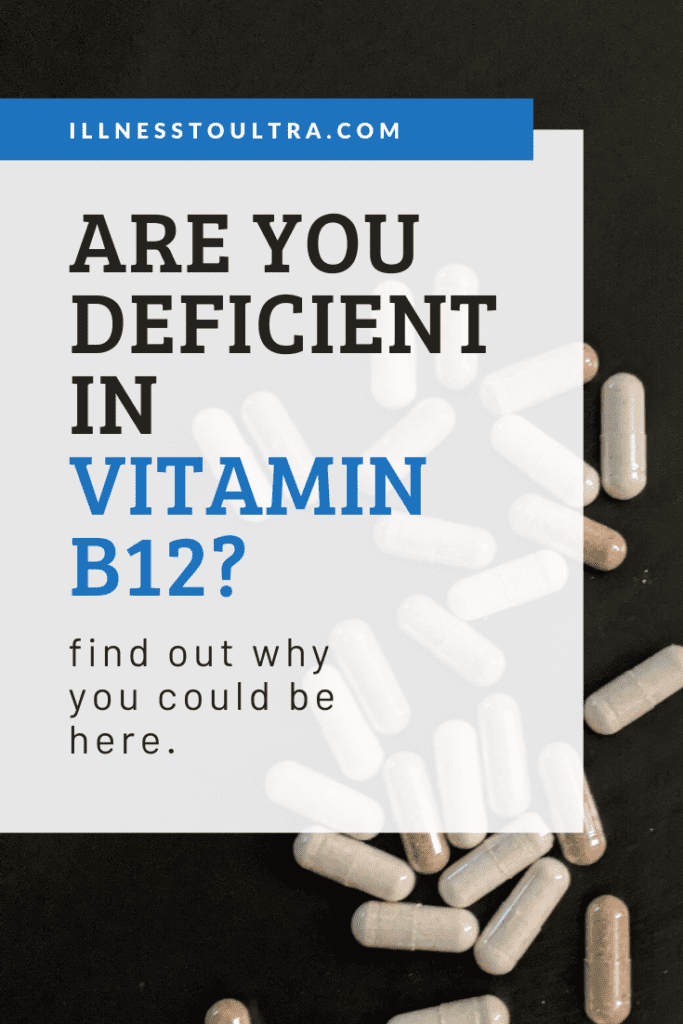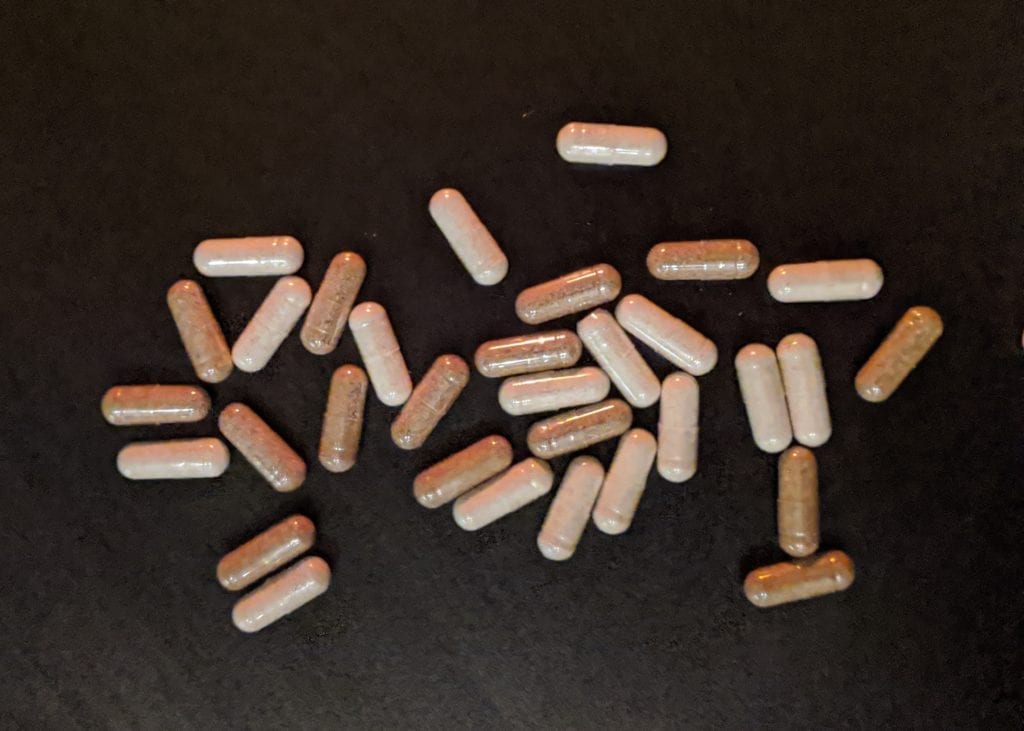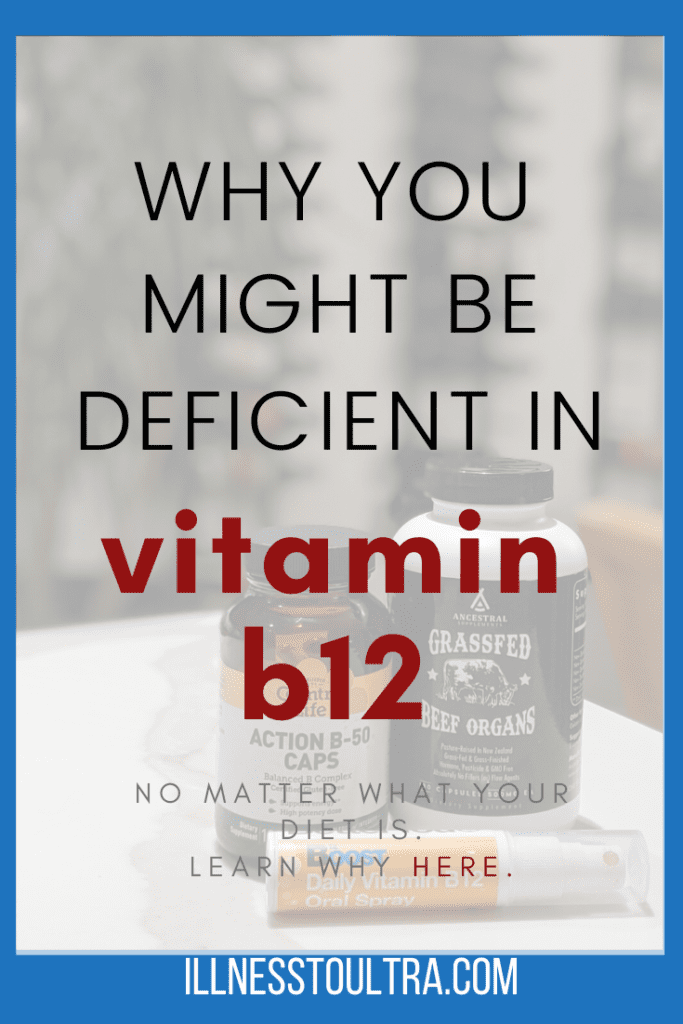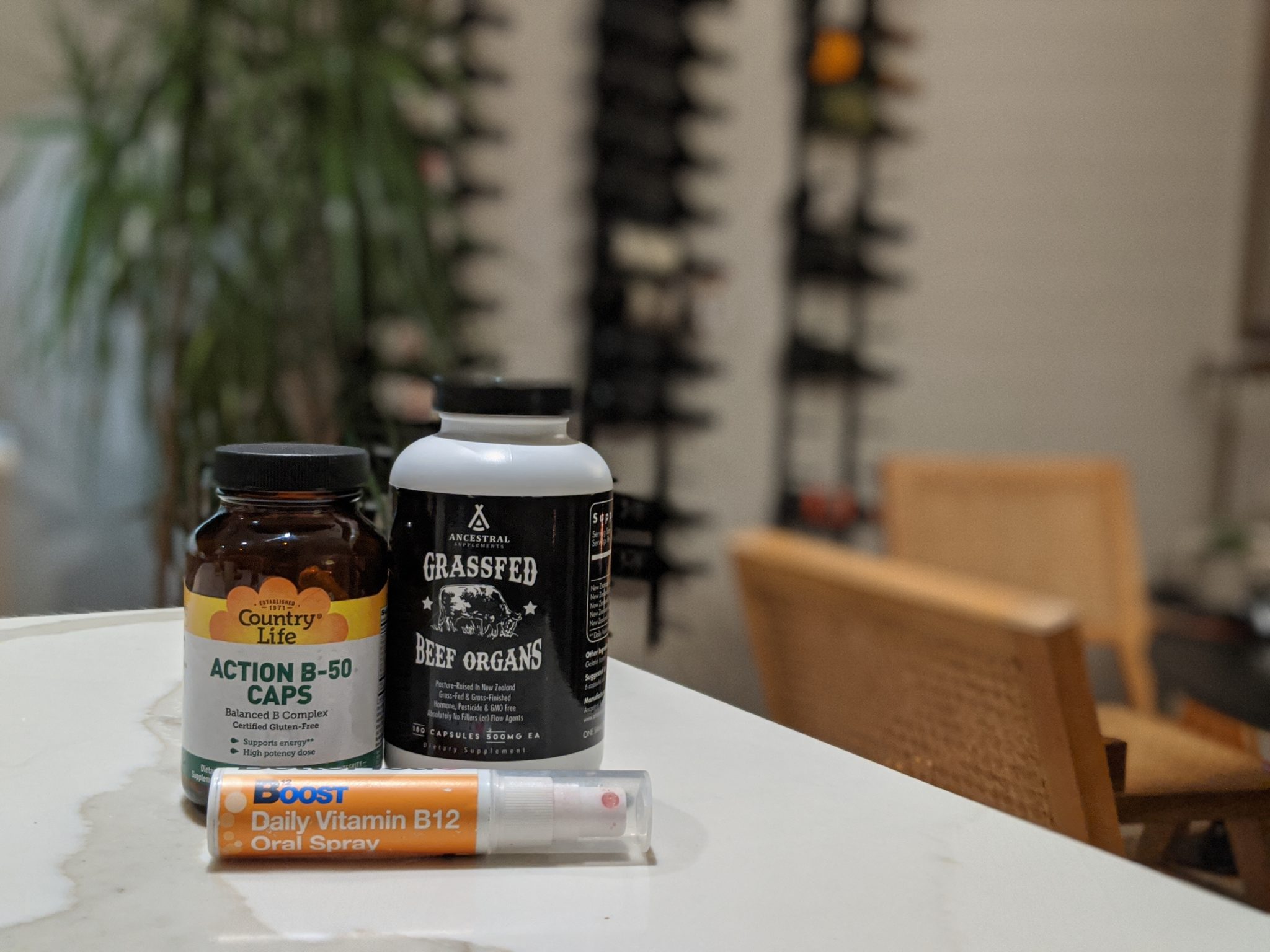First off, there are actually many more cases were individuals have a B12 deficiency because of issues like Pernicious anemia.
Secondly, statistics that give us a population count of those with B12 deficiency vary drastically. This is mainly due to no one agreeing on what the optimum B12 level is or even how we should test for it.
What is Vitamin B12?
B12 is a vitamin used for the creation of DNA, one of the building blocks of all cells in the body. It also essential in the methylation process, which is required for detoxing, many metabolism processes, neurological stability, and much more.
We do know that the elderly, vegetarians, vegans and individuals with poor digestion are at risk of deficiency. So if you’re here because you have an autoimmune disease or a chronic illness, you most likely have poor digestion too, therefore you’re probably at risk.
Another factor that causes B12 deficiency is the food that we’re eating in today’s world. We used to eat the dirt, we used it the WHOLE animal, we used to eat vitamin-rich foods. Now we’re fed whatever the industrial farms throw at us. Surprise surprise, they’re not full of quality vitamins.
I had to learn all about B12 the hard way. There’s so much vague information out there, and even many medical professionals get testing wrong. If you are possibly fighting a B12 deficiency then please read through and understand the steps to take to, test, supplement and test again.
Am I Vitamin B12 deficient?
Maybe. There are lots of symptoms that people often overlook.
- Tiredness
- Weakness
- Tingling in your extremities
- Issues with your sight
- A smooth tongue
- Memory issues
All of the symptoms are possible but all of these do not manifest in everyone, which makes a diagnosis without lab work difficult. Therefore, if there are any issues present it’s always best to test for a deficiency.
B12 Blood level tests
Serum Test
Doctors normally order a serum test to measure B12 levels. This test will measure the amount of B12 floating around in the bloodstream which equates to the amount of B12 you’ve absorbed from your diet.
However, there are many flaws in the B12 serum test.
First, it only measures the amount of B12 floating around in the bloodstream. The body requires extra processes to utilize the B12 in the bloodstream. If any of these processes fail to occur, you’re still likely still B12 deficient because the vitamin has not been processed in the required way for our bodies to efficiently utilize. Therefore, we may have B12 in the bloodstream, but that does not mean our body is converting it correctly to be beneficially used.
Second, is that a B12 serum test can be fooled. They measure the molecules that look like B12 also. There are certain molecules that masquerade themselves as B12, which have long confused many vegans. The body absorbs but cannot utilize sources like Spirulina and Nori which contain the “fake” B12. To add to the issue, because the “fake” B12 is using the same pathway, the possibility that the “real” B12 will make it across into the bloodstream is less likely – exacerbating a deficiency.
There are many other reasons why serum B12 tests are a substandard test for measuring B12 deficiency including
- Testing too soon after B12 supplementation or injections.
- Bacterial overgrowth
- The body is unable to use B12 from the blood
- Various genetic and disease-related failures
The only area where a serum test is deemed useful is with a low result. If levels of less than 200 ng/mL are measured, it’s possible to diagnose a B12 deficiency and supplementation should be advised.
Holotranscobalamin Test
The Holotranscobalamin test is fairly similar to the standard B12 serum test. The only difference is that it only measures the “usable” B12 in your blood.
The “usable” B12 in your blood is bound to transcobalamin, which only makes up for around 6-25% of the B12 content of the blood. Now we know this information, we have yet another reason why the standard serum B12 test is poor.
Although the accuracy of the Holotranscobalamin test is much better than a serum test, it still suffers from some similar substandard issues. If bodily processes fail to use the B12 from the blood, you could still show signs of a deficiency.
Holotranscobalamin can usually be ordered by your doctor or medical professional, but its usage is still fairly uncommon in the medical field.
If a level of less than 50 pmol/l is recorded, B12 deficiency is likely.

Indirect B12 labs
A more accurate way of determining a B12 deficiency is to measure the downstream effect. As we know, B12 has many important roles in the body, and by measuring the efficiency of these roles we can determine the usage of B12.
Homocysteine
Homocysteine is an inflammation marker in the blood used to determine various cardiovascular issues.
High levels of homocysteine have been linked with blood vessel damage, causing further issues such as high blood pressure, heart attacks, and strokes. Keeping your homocysteine levels low is a priority.
Even though it is a good health marker, there is a dispute about whether homocysteine is the cause of cardiovascular issues. Many believe that other various nutrient deficiencies cause high levels of homocysteine – not just vitamin B12. Therefore it’s important to look further into the reason why your homocysteine is high.
To reduce homocysteine in our system we require chemical reactions in the cells to be working correctly. These chemical reactions are called the methylation process and are occurring all the time.
As part of the methylation process, homocysteine (which we want to reduce) is converted into methionine (a required amino acid), and to do this B12 is required.
If there is a lack of B12, the methylation process starts to break down and homocysteine starts rising – which, again, is not good. Because of this, it’s an acceptable assumption that if homocysteine levels are high, B12 is most likely low.
There’s one little twist here though! Another vitamin required for the methylation process can also cause high homocysteine: folate. So it’s important to test further and in different ways to ensure you’re treating the right deficiency.
MMA test
Testing methylmalonic acid (MMA) is one of the most reliable ways of determining a B12 deficiency, as it is the only vitamin to affect the breaking down of MMA.
There are only very rare cases where MMA levels are manipulated by external factors like bacterial overgrowth and other very serious nutritional deficiencies.
MMA can be found both in the blood and urine, meaning a simple urine test can be performed to measure MMA levels. The timing of collecting the urine sample is one known drawback to the test. It’s important to collect the sample in the morning, ensuring that no urine has been passed throughout the night. If the urine has been passed during the night, the markers of the metabolization of the MMA will be missed and inconclusive results will be seen in the morning urine.
Which test?
Determining a B12 deficiency can be difficult depending on the situation. It’s advised to use a combination of the tests above, as well as analyzing your nutritional intake to gain a better understanding.
As a general rule, relying on indirect B12 lab tests – such as Homocysteine and MMA – prove for better diagnosis and provide better markers to track levels over time.
Symptoms of a B12 Deficiency
A B12 deficiency manifests itself in many different ways and can be difficult to diagnose from evaluating only symptoms. Irregularities differ from person to person, because many different fundamental processes require B12.
Short Term Effects
There is a delayed effect when fighting with a shortage of B12. The liver is known to store anywhere from 3 – 5 years worth of B12 to use when consumption of the vitamin falls short. During this time period, it’s easy for people to write off minor symptoms that occur like fatigue and mood swings. We often link these symptoms to stress or a recent illness is the source of the problem, rather than a B12 deficiency. Other symptoms include
- Fatigue
- Inability to concentrate
- Weakness
- Headaches
- Sores around the mouth
If B12 deficiency is caught at this stage it’s simple to use supplements and return levels back to a normal range with no long term damage or long-lasting effects.
Long Term Effects
When nutritional requirements of B12 are not meet for long periods of time, the stored amount of B12 in the liver will become depleted. The body will then have little to no B12 to draw upon and much more severe symptoms will occur. These include
- Suppressed Immunity
- Sores around the mouth
- Smooth tongue
- Numbness and tingling sensations in the extremities
- Vision issues
- Weight loss
- Balance, dizziness, and difficulty walking
- Swelling of the joints
- Gut damage and malabsorption
- Anxiety and depression
- Poor memory and confusion
As can be seen from the list above, the symptoms are wide-ranging. At this point, many of the body’s normal functions start to breakdown. If action is not taken then irreversible damage can occur.
How to get enough B12
Due to the depletion of nutrients in the soil, our natural sources of B12 in the modern world are becoming more scarce. Our intake of B12 is now mostly limited to animal sources. Therefore, if you are following a vegan diet it’s important to choose a quality supplement to complete your nutrient intake.
Malabsorption can often be the root cause of a B12 deficiency, therefore a diet of foods with a small amount of B12 will most likely not provide enough B12 for the body.
Animal Sources
B12 is abundant in certain animal sources, but that does not mean that a meat-eater cannot have this vitamin deficiency too. In the past, the human species ate every part of an animal. In modern society, we now limit ourselves to specific cuts of meat (predominantly the muscles and fat) and we focus on eating only beef, chicken, and pork (rather than a variety of animals).
However, the concentration of nutritional benefits is in the organ meat. Organ meat (in particular, the liver and kidneys) is often high in B12. Lamb is also a great source of B12 with 100g of lamb liver providing 1500% of the RDA.
And interesting experiment I’m doing right now is trying to fulfill my B12 intake with organ supplements. I do this with a product from ancestral supplements which you can find out more about at my Recommendations page.
Shellfish like clams, oysters, and mussels offer a high amount of B12, too. 100g of any of these shellfish offers 800%+ of the RDA.
To compare, 100g of beef only contains around 100%, 1 egg gives 11% and a cup of milk contains 18% of the RDA. If you pair these figures with poor absorption, it’s easy to see how B12 deficiency can be a problem for meat-eaters as well as vegans and vegetarians.
Vegan sources
It may surprise you to learn that B12 is not derived from animals. It’s actually produced by microorganisms in many different natural environments. Therefore, I want to emphasize that B12 is not an animal product and is actually available in vegetables.
In the past when soils were healthy and sanitation was less of a concern, humans would have consumed fruits and vegetables thriving with microbes. Some of these microbes would have been producing B12 has a byproduct. The amount of B12 on plants would have only been a minor amount, but in today’s world – where pesticides are widely used and vegetables are washed thoroughly before consumption – we are not receiving any B12 vitamins from the plants we eat.
It was originally thought that sea vegetables are a good source of B12 – and this information might still be circulating the health scene circuit. However, the thought behind the reason is mostly incorrect. Items like miso, spirulina, and seaweeds contain a “B12 like” molecule which looks and acts very much like B12. The issue is that it is not B12, however much it seems like it.
This ‘B12 wannabe” cannot be utilized by the body after transiting into the bloodstream.
The pathway from the gut into the bloodstream is limited by finite resources. If too much of this “B12 wannabe” is transferred into the blood it leaves fewer resources for real B12 absorption, only making B12 deficiency worse.
NOTE: If you are B12 deficient and you are consuming spirulina or a sea vegetable known to be high in these “B12 like” molecules, stop now and consult a doctor. It might be making your deficiency worse.
Nori and Chlorella are thought to possibly contain real B12, and be a good vitamin source for vegans and vegetarians. The drawback of these two sea vegetables is that the B12 they contain is due to bacteria content living on the plant. Growing conditions can have a dramatic effect on the B12 content and will vary throughout the year dependent on rainfall and sea conditions. This makes it difficult to wholeheartedly suggest algae (Nori and Chlorella) as a reliable B12 source.

Supplementation
Having discussed this previously in detail, it should be clear that the only real sources of B12 should be consumed. If a supplement derives it’s B12 from a sea vegetable then it’s wise to steer away from it in favor of a trusted source of tested B12, such as the sources I discuss below.
There are numerous forms of B12 that can be converted/absorbed into the body in order to fulfill the requirement. As always some are better than others. The following section aims to tackle this matter and guide you to the right decisions regarding your B12 vitamin supplement.
Methylcobalamin
Being the most popular form of bioactive B12 supplementation, Methylcobalamin is becoming easier to find over the counter. The fact that it is bioactive means that it can be used directly by processes within the body. Some manufacturers refer to the form as pre-methylated.
It is preferred by many in the medical field as it is bioactive and can be retained for longer periods of time in the bloodstream in comparison to Cyanocobalamin, discussed later.
Supplementation containing Methylcobalamin is often used when high results of homocysteine are observed. Known as hyperhomocysteinemia, high homocysteine is linked with an inadequate methylation process. This can be due to various genetic reasons, but it is mainly due to inadequate intake of vitamins. If the body is lacking in B12 or folic acid, it is unable to convert homocysteine. As mentioned before, high levels of homocysteine have been linked with various cardiovascular issues, among other things.
The methylation process requires the bioactive form of Methylcobalamin, therefore this pre methylated form has become popular in recent years, in order to treat various B12 deficiencies.
Adenosylcobalamin (Dibencozide, Cobamamide, Cobinamide)
Adenosylcobalamin is a natural and active form of B12, mainly found in the food we eat. As it is naturally occurring, we can absorb and use this form of B12 directly in our bodies without any need for conversion.
The liver stores anywhere from 3-5 years worth of B12, in addition to this we also hold a store in the muscles and other organs. The storage of B12 is in the form of Adenosylcobalamin, therefore it’s important to ensure your B12 supply is always topped up.
B12 is important in many processes but the different forms of B12 have jobs.
- Methylcobalamin is important in the methylation process.
- Adenosylcobalamin is used in the production of adenosine triphosphate (ATP), which is the energy used throughout the whole body.
Due to the storage of Adenosylcobalamin and the different uses within the body, it’s important that Methylcobalamin and Adenosylcobalamin have adequate amounts within the body. It may be harder to find Adenosylcobalamin in supplement form due to past regulations, but it is available out there.
Cyanocobalamin
Cyanocobalamin is the most common form of supplementation on the market. It can even be found in fortified products like almond milk, cereal, rice and many more.
It is a synthetic version of B12. This means it requires a transformation to convert the synthetic B12 into an active form that can be used by the body. The conversion in a healthy human is usually optimal and an adequate amount of Methylcobalamin and Adenosylcobalamin is created.
Issues with cyanocobalamin come about when chronic malabsorption and general poor health effects the conversion and absorption of vitamin B12. Studies show varying degrees of success from person to person, therefore we cannot rely on cyanocobalamin for a blanket treatment of severe B12 deficiency.
If an individual is fairly healthy and looking to keep their B12 levels in a good range, Cyanocobalamin can be a cost-effective way of achieving this.
It’s important to note that there is much talk about the toxicity of Cyanocobalamin and with good reason. When ingested in the body a reaction splits the B12 from the cyano group, which in turn produces cyanide. This might be alarming but the levels we are looking at here are so low that only people with high cyanide risk exposure (smokers) need to worry about this. However, this is something to think about when choosing a supplement.
Hydroxocobalamin
Hydroxocobalamin is the chameleon of the B12 family. It is the most common source of B12 in foods we eat, and also prevalent in the human body. Even though it is not a bioactive form, within the body it has the opportunity to convert into either Methylcobalamin or Adenosylcobalamin, making it a very useful form of B12 deficiency treatment.
Often administered via injection, Hydroxocobalamin is known for its ability to bind to the body’s transport mechanisms. It lends itself to longer-lasting effects and less wastage in comparison to a synthetic alternative like Cyanocobalamin.
Hydroxocobalamin is adaptable and highly efficient, because of this, many advise supplementation containing this B12 form, along with the two active forms, Methylcobalamin and Adenosylcobalamin.
Like this post? Pin it and follow me for more posts like this!

